I’ll be excited to join a National Cowboy Poetry Gathering panel in a few weeks to talk about the state of horses in the 21st century. In Elko, at Western Folklife’s G Three Bar Theater, I’ll sit with Randy Rieman, Bryan Neubert, and Maria Lisa Eastman to discuss Of Horses and Riders. Come join us on Saturday, February 1. Read about Special Sessions here. Or, check out the entire NCPG schedule here.
This is the Part III of an essay on the future of horses.
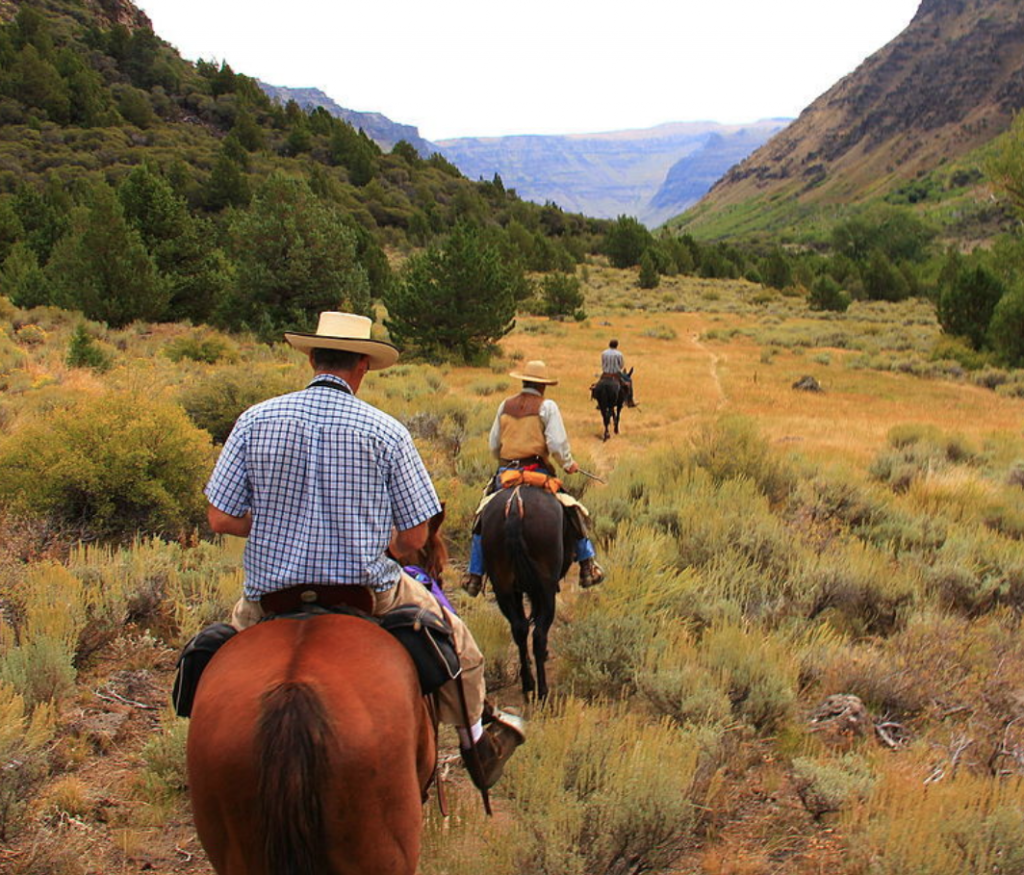
Courtesy of HCN
When I’m asked to forecast the future of horses in the 21st century, I see partly cloudy skies.
I think first of the wildly different stances people assume around horses in our lives, in our neighborhoods, and on our trails. I consider, for instance, the wildly different reactions to an op-ed I wrote for High Country News and which was subsequently republished by Adventure Journal and many other media outlets. It went viral.
On HCN, the comments were supportive and acknowledged the horse’s place in outdoor recreation and in the history of the American outdoors. Meanwhile, on Adventure Journal’s site, readers’ reactions could be summed up in a few choice words, “Get outta my way, old timer. And take the manure with you.”
I have news for my fellow riders of the woods: It’s going to get worse. Getting horseback in big country might seem sexy and iconic as an idea, but on the ground, bikers and hikers don’t like the poop or the sizeable foreignness of horses.
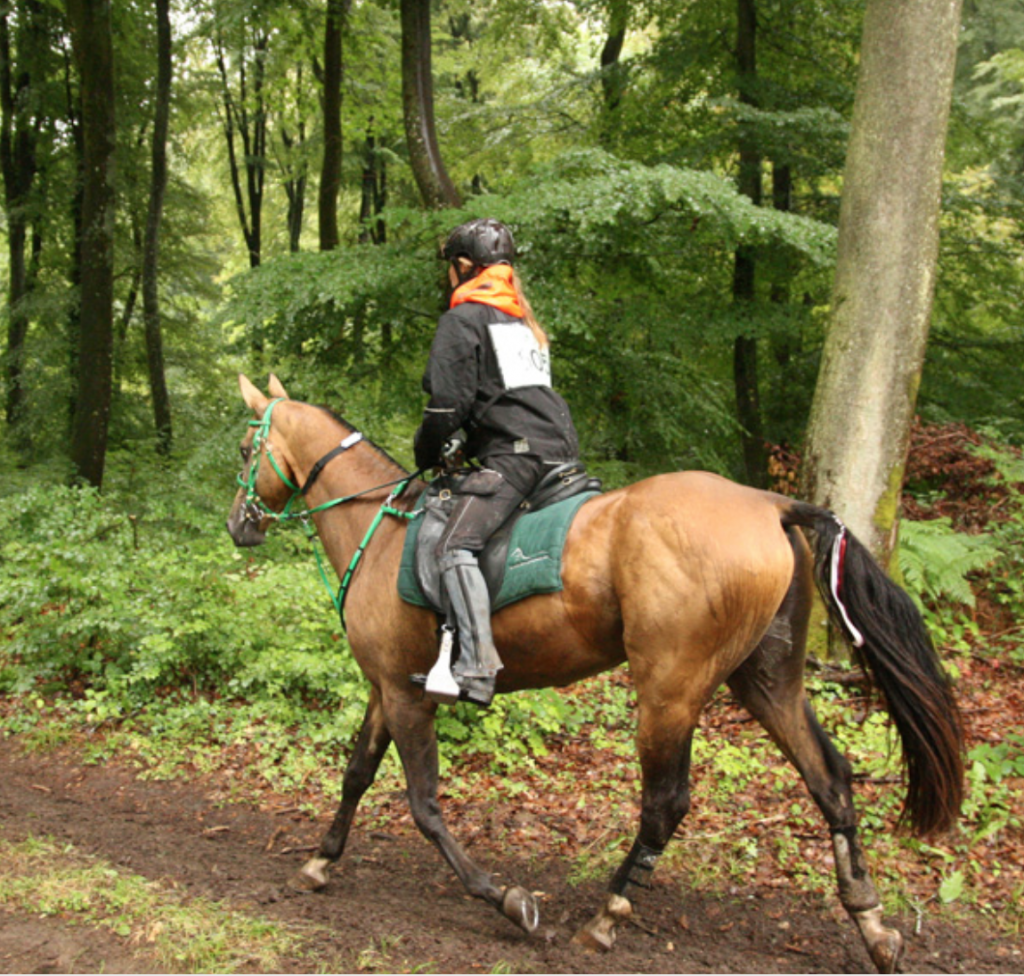
Courtesy of Adventure Journal
To make matters worse, we number increasingly few on today’s public lands, when compared to runners, hikers, mountain bikers, and even electric bikers (ee-gads!). In pubic digital spaces (like Instagram, Facebook, etc.), we are an aging, underrepresented population, too. Backcountry Horsemen, a national organization that boasts hundreds of chapters and works on scores of trail maintenance projects every year, doesn’t even have an Instagram page (although some individual chapters do). Compare this silence to, say, the social media shout-outs and representation for hunters.
Recently, the Theodore Roosevelt Conservation Partnership, which has 50,000 followers on Instagram and more than 75,000 on Facebook, shared news that Congress had issued legislation to invest in the future of hunting, addressing its declining participation. The post got more than 1,400 “likes.”
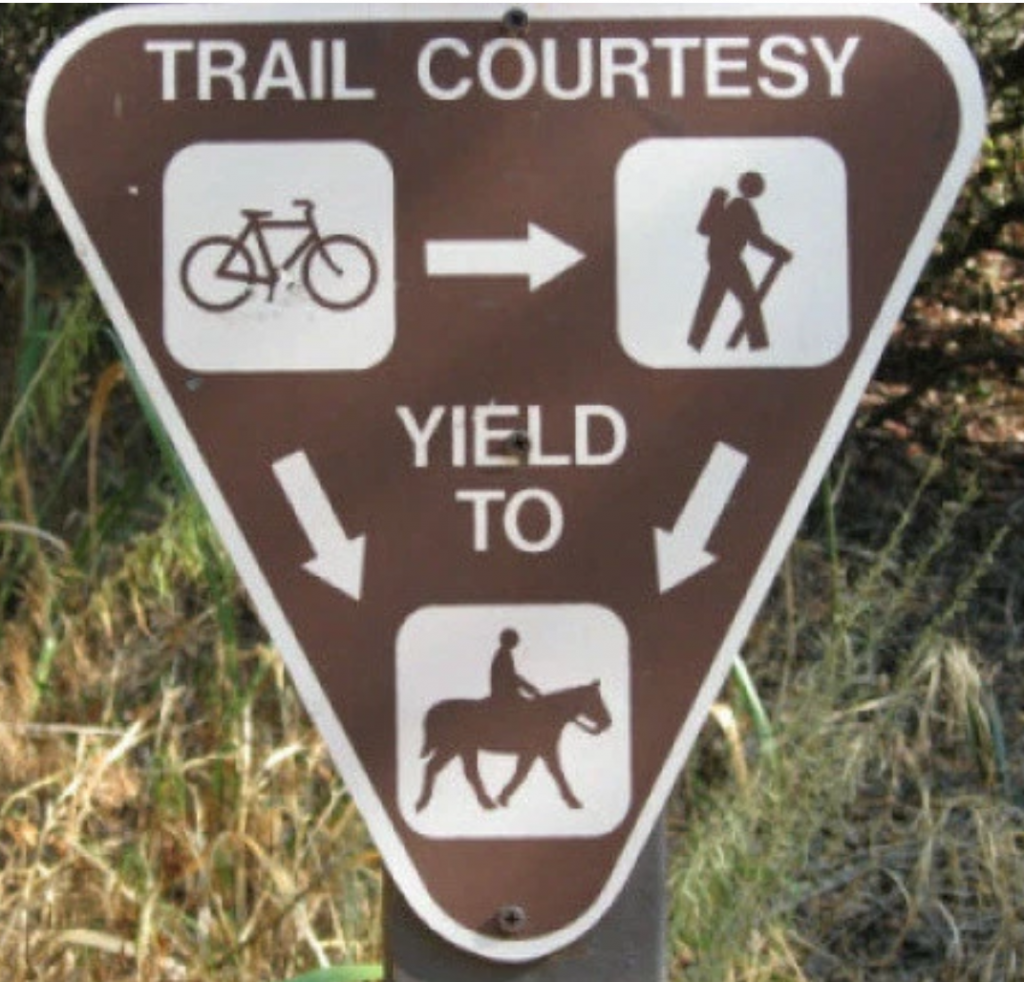
An indefinite rule?
Show me an initiative to address the declining participation in trail riding. Show me some nationwide, equine organizations, non-profits or for-profits, that are effectively taking up this cause. Isn’t riding on public lands as storied and worthy as hunting on public lands? Our lack of collective social media presence and collective enterprise will certainly contribute to our downfall.
Part of the problem is our niche-ness.
I was talking with a Purina guy at the Equine Affaire in Massachusetts a few years back. Since I’ve spent lots of time with horses in Maine, Massachusetts, Ohio, Iowa, Montana, Utah, and Colorado, I wanted to know what he thought about the broad spectrum of horse keeping across the country. He laughed, “a woman in California once asked if I could suggest a good Thursday feed. Her horse was turned out 24/7. She checked on him once a week.”
Meanwhile, plenty of suburban horses are managed more intensely. Riders sometimes do not ride outside an arena. Owners spend lots of time mucking stalls, blanketing and un-blanketing, grooming, and feeding custom diets. Among my horse-owning friends in Colorado, no one does this. Is it any wonder we struggle to relate to one another?
Disconnects hurt our chance to unify over what might seem like common issues. Take public land use and access, for example:
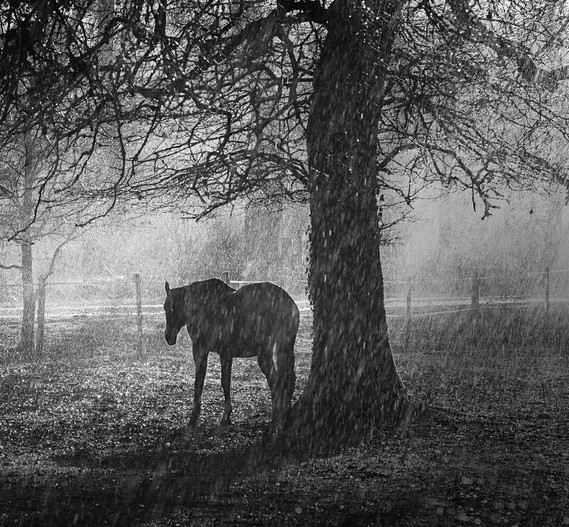
Tree shelter is okay in the West. Not okay back East.
In the Northeast, there is scant riding on public land because there is scant public land. But in the western U.S., vast swaths of states belong to everyone.
Take welfare issues:
Along with most of my fellow Colorado horse owners, I could be cited for how I keep my horses if I lived back East where many states require at least three-sided shelters for any horse acreage. Groves of trees provide cover here.
How do we unite when our mindsets are so incongruent? We all love horses, but we have hugely different challenges, goals, expectations, incomes, abilities, and cultures. Sure, there are popular associations for rodeo, eventing, dressage, jumping, gymkana, vaulting, reining, and every breed under the sun. Car owners have these kind of niches, too, but they all still tend to have AAA for road service. Where is our AAA?
I’m excited about more folks discovering horses through therapy. Perhaps equine-assisted services will be a knight in shining armor for the future of horses in the 21st century.
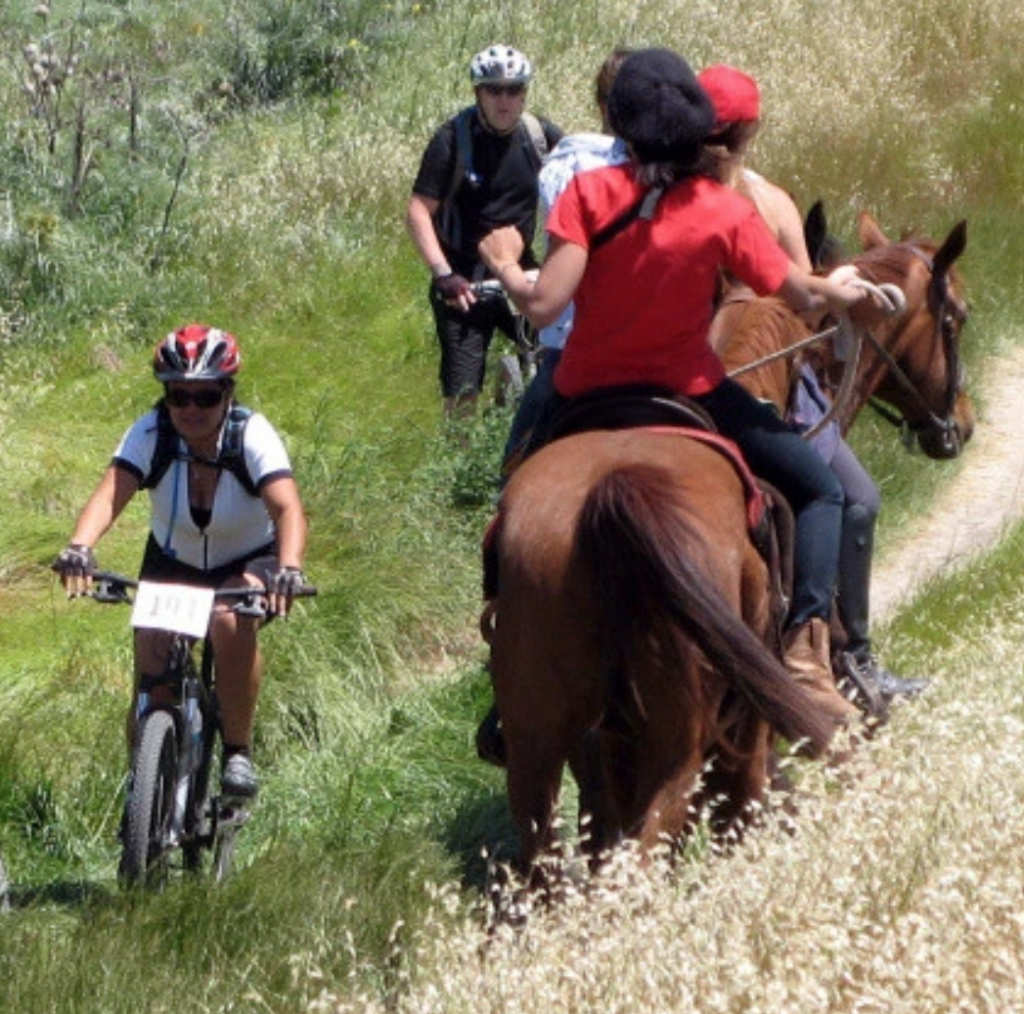
Bike – Horse injuries are on the rise. Courtesy of OC Register.
Perhaps.
It’s terrific that more and more health insurance companies cover equine-therapy. Every day, new riders are being introduced to its powerful benefits at over 400 PATH centers and other facilities. Horse work like this is also an attractive optic that works for enlisting men and women, young and old, able and disabled.
Peripheral outfits like Heroes and Horses (a Montana operation which guides veterans with horses) and spa retreats with riding elements are having a good time of it, too. All kinds of groups are finding ways to introduce horses to urbanites. And, in case you hadn’t read the news – our world is becoming increasingly urban.
But still I worry for horses’ future. Like my friend, Dan, who felt sorry for the aussie-doodle puppies bred for cuteness, I wonder how human prerogatives will alter horses and horse keeping over time.
Will most horses be draft crosses – mild-mannered and able to carry the average, overweight American?
Will they be hypoallergenic?
Alas, any semblance of a horse will still be better than a robotic one, right?
Wonderful article and so true about the diverse segments of horse culture. I’ve been an equine massage therapist for 24 years in Montana. Despite what you might guess, we have a diverse population of riders who represent the broad spectrum of stalled horses to horses always out on rangeland, and my clientele includes all of those. I heard many people judging and criticizing other riders for their care practices, riding technique, and on and on. Quite by chance I started organizing monthly Saturday clinics with trainer Jess Holloway of Bozeman. When he came to Helena, we attracted all kinds of riders from a rancher who had range horses to a boarding facility owner who evented and rode dressage. At first, there were a lot of hard looks and little conversation. Then we asked everyone who came for lessons to bring a dish and join us for potluck lunch. Pretty soon everyone realized they had HORSES in common and lots to share. Friends were made and we shared laughter, tears, problems and solutions around the table each month. We continued these Saturdays for about 5 years. Perhaps if we all start with what we have in common and spend time listening to each other from our hearts, we can keep horses front and center – where they should be. Keep up the great work you are doing!
I was literally thinking about changes as I ride in an arena (not normal for me) in Texas. Our horse is down for the winter. This is the first time we travelled south for the winter. I was struck by the different mindset on horse care. Normally we ride out on BLM in northern New Mexico and we care for our horse in our back yard.
There is value in arena work but I find myself missing the great outdoors (in this case arena😉). We our blessed in the West to have public lands to share. Somehow dialog with all sharers need to remain open so we-all- can still use our public lands. I have been very lucky to run in to considerate bikers and hikers and motorcyclists. Unfortunately, we remember those few who are not. For myself, I always thank those mindful public lands users.
I also miss not seeing our horses in the back yard. One example of difference in approach of horse care is blankets. We normally do not blanket because we want our horses to grow hair for the winter. Here in Texas there are a lot of blankets. I believe there are no right answers except what works for your horse and your environment. Since we have been here, my horse has not grown out his hair. So, when occasionally the temperature drops, I have put a lightweight blanket on him as he is an old horse. I may have not done that up north as his hair would have been long. Ironically, I see many parallels between horse care and parenting. Instead of opinions I try to listen and be supportive and give opinions only when it’s solicited
Sorry if this is long winded but your article hit home for me. Thank you for sharing.
The small California town where I lived as a child put the neigh in neighborhood. Designed specifically for horse-keeping, zoning required a four-foot easement for horse trails next to the curvy roads that demanded slow motorized vehicle speeds. Two private schools in town required riding as part of its curriculum and college students got summer jobs maintaining the trails through the adjoining Los Padres National Forest. My friends all had a horse in the backyard or we rode other people’s.
Fast forward 40 years. Because Ojai is 80-ish miles from Los Angeles and possibly more scenic than Laurel Canyon, the urban-centric population has exploded here. In practice, those trail easements have disappeared though they may still be on the books. Teslas and Ferraris vroom past the citrus and avocado orchards where we ride. Narrower and with an occasionally decapitating canopy, most of the trails into the national forest have lost their horse-centric nature as we have lost the federal funds to keep throngs of young rangers.
Land use is all about politics and as Tip O’Neill said: All politics is local. We’re going to have to talk with our neighbors (originally meaning the people whose horses we can hear whinny) about taxation, public lands, and local zoning. Volunteer to sit on planning boards, run for local office, or at the very least find out what groups currently make the decisions and call the members.
From my view, the loss of access has come largely from our preference for our own silo and our disdain for local politics. We can do better. We have to do better if we want to continue to keep horses at the center of our lives.